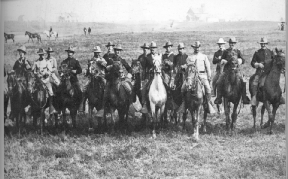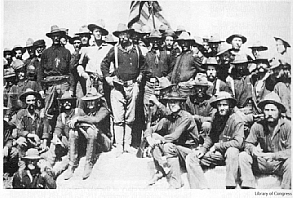Rough Riders
 Since 1895, Cuban rebels had been
revolting against their Spanish rulers. Many Americans demanded
the United States help the Cubans. On February 15, 1898, the U.S.
battleship Maine blew up in Havana harbor. Roosevelt tried
to rush preparations for war against Spain. He became impatient
with McKinley’s attempts to avoid war. In private, Roosevelt
complained that the president had "no more backbone than a
chocolate éclair." Lon April 25, 1898, the United States
declared war on Spain.
Since 1895, Cuban rebels had been
revolting against their Spanish rulers. Many Americans demanded
the United States help the Cubans. On February 15, 1898, the U.S.
battleship Maine blew up in Havana harbor. Roosevelt tried
to rush preparations for war against Spain. He became impatient
with McKinley’s attempts to avoid war. In private, Roosevelt
complained that the president had "no more backbone than a
chocolate éclair." Lon April 25, 1898, the United States
declared war on Spain.
Roosevelt third from left.
After Roosevelt declared war on Spain, he being an unusual
volunteer regiment filled with hardy western cowboys and Indians,
as well as refined Ivy League college graduates, immediately
resigned as assistant secretary of the Navy so he could fight.
Even before resigning, he had started to recruit men for a
cavalry regiment. This unit became the First Volunteer Cavalry
Regiment. 
About 1,000 men, all good shots and good riders were recruited
for the unit. It soon became known by the nickname rough riders,
a popular name for Western cowboys. Most of the men were former
college athletes and Western cowboys. Leonard Wood commanded the
Rough Riders when the regiment was first formed. Later, Roosevelt
became colonel in command.
Roosevelt standing in middle
The Rough Riders had their greatest day on July 1, 1898,
during the battle of San Juan Hill in Cuba. Roosevelt led his men
in a victorious charge up "Kettle Hill" which is near
San Juan Hill. Many Americans died I the charge, but those who
survived were hailed as heroes. The fame of the Rough Riders
later helped Roosevelt in his political activities. Being on
horseback, Roosevelt was able to advance well ahead of his food
soldiers. 
The Rough Riders rushed for the crest of Kettle Hill in the
face of enemy fire, until the Spaniards threw down their guns and
ran. The Rough Riders shouted for joy and cheered in victory.
During the next few days the U.S. Army fought off repeated
Spanish counterattacks, while the U.S. Navy destroyed the Spanish
fleet trapped in Santiago harbor. By the middle of July 1903, the
war in Cuba was over. Americans seeking to learn more about
Roosevelt discovered he as a man of many talents. Secretary of
State John Hay truthfully described him as being a man "of
gentle birth and breeding, yet a man of the people . . . with the
training of a scholar and soldier . . . with the sensibility of a
poet and the steel nerve of a rough rider." Above all,
America’s new folk hero was a man of incredible energy and
potential, Theodore Roosevelt.
Roosevelt riding in attack
 Since 1895, Cuban rebels had been
revolting against their Spanish rulers. Many Americans demanded
the United States help the Cubans. On February 15, 1898, the U.S.
battleship Maine blew up in Havana harbor. Roosevelt tried
to rush preparations for war against Spain. He became impatient
with McKinley’s attempts to avoid war. In private, Roosevelt
complained that the president had "no more backbone than a
chocolate éclair." Lon April 25, 1898, the United States
declared war on Spain.
Since 1895, Cuban rebels had been
revolting against their Spanish rulers. Many Americans demanded
the United States help the Cubans. On February 15, 1898, the U.S.
battleship Maine blew up in Havana harbor. Roosevelt tried
to rush preparations for war against Spain. He became impatient
with McKinley’s attempts to avoid war. In private, Roosevelt
complained that the president had "no more backbone than a
chocolate éclair." Lon April 25, 1898, the United States
declared war on Spain. 
